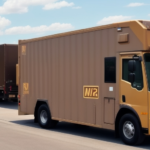Understanding the Wholesale Shipping Rates of UPS
UPS is one of the largest shipping carriers globally, offering a wide range of shipping services tailored to individuals and businesses alike. Among its most sought-after offerings are UPS wholesale shipping rates, which provide significant savings for businesses with high-volume shipping needs. These discounted rates enable companies to reduce their shipping expenses by leveraging lower costs for bulk shipments. In this article, we delve into UPS's wholesale shipping rates, exploring their history, advantages, qualification criteria, rate factors, shipping options, cost reduction strategies, common pitfalls, best practices, calculation methods, measurement accuracy, third-party logistics (3PL) providers, successful case studies, and future trends.
The History of UPS Shipping Rates
Founded in 1907, UPS began as a messenger service in Seattle before expanding into shipping services in 1919. Over the decades, UPS has grown into a global leader, shipping to over 220 countries and territories. The evolution of UPS's shipping rates reflects its adaptation to market demands and competition. In the 1980s, facing increased competition from FedEx and DHL, UPS introduced innovative shipping rates and services, including next-day air and ground shipping, to maintain its industry leadership.
In recent years, UPS has emphasized sustainability, implementing initiatives like alternative fuel vehicles and optimized delivery routes to reduce its carbon footprint. These efforts have also influenced its shipping rates, with options like carbon-neutral shipping catering to environmentally conscious businesses.
According to UPS's 2023 annual report, the company continues to refine its rate structures to offer competitive pricing while maintaining high service standards. This strategic approach ensures that UPS remains a preferred choice for businesses seeking reliable and cost-effective shipping solutions.
Advantages of Wholesale Shipping Rates for Businesses
Utilizing UPS's wholesale shipping rates offers several advantages for businesses that ship frequently or in large volumes:
- Cost Savings: Significant reductions in shipping costs allow businesses to allocate resources to other areas, enhancing overall profitability.
- Dedicated Support: Access to dedicated account managers who provide personalized support and shipping solutions.
- Expanded Shipping Options: Greater flexibility with expedited, international, and specialized shipping services, catering to diverse customer needs.
- Improved Customer Service: Enhanced shipping reliability and speed lead to better customer satisfaction and loyalty.
For instance, a 2023 survey by Supply Chain Management Review highlighted that businesses using wholesale rates experienced an average shipping cost reduction of 15%, directly impacting their bottom line positively.
How to Qualify for UPS Wholesale Shipping Rates
To qualify for UPS wholesale shipping rates, businesses typically must meet specific volume thresholds. These requirements can vary based on the UPS service but generally include:
- A minimum of 75 packages per week
- Annual shipping costs exceeding $100,000
Additionally, businesses may need to undergo an application process, maintain a valid UPS account in good standing, and demonstrate consistent shipping volumes. It's essential to regularly review UPS's eligibility criteria, as these may evolve to accommodate changing market dynamics.
If your business does not meet the wholesale rate qualifications, alternatives include UPS's retail rates or other shipping discounts and promotions. Staying informed about UPS's periodic offers can provide additional savings opportunities.
Factors that Affect UPS Wholesale Shipping Rates
Several factors influence UPS’s wholesale shipping rates, including:
- Shipment Volume: Higher volumes typically qualify businesses for greater discounts.
- Package Size and Weight: Larger and heavier packages incur higher shipping costs.
- Destination: International shipments may carry additional fees compared to domestic shipments.
- Service Type: Expedited services like next-day delivery are more expensive than standard ground shipping.
- Sustainability Efforts: Businesses meeting certain environmental criteria may receive additional discounts.
Moreover, the nature of the products being shipped can impact rates. For example, shipping hazardous materials or perishable goods may involve specialized handling fees. Proper classification and adherence to UPS's shipping guidelines are crucial to avoid unexpected costs.
Understanding these factors allows businesses to strategically plan their shipping practices, optimizing costs while meeting operational needs.
Understanding the Different Types of UPS Shipping Options
UPS offers a variety of shipping options to cater to different business needs:
- Ground Shipping: Cost-effective for non-urgent shipments, ideal for domestic deliveries.
- Air and International Shipping: Provides faster delivery times and international reach for global businesses.
- UPS My Choice: Offers enhanced tracking and delivery management features for better control over shipments.
- UPS Access Point: Convenient pick-up and drop-off locations for flexible delivery options.
For specialized industries, UPS provides tailored solutions:
- UPS Healthcare: Temperature-controlled shipping for sensitive medical products.
- UPS Retail: Customized shipping solutions designed for small businesses and retailers.
Choosing the appropriate shipping option is critical for balancing cost, speed, and reliability, ensuring that shipments meet both business and customer expectations.
Comparing UPS Wholesale Shipping Rates with Other Carriers
While UPS is a leader in the shipping and logistics industry, it's essential for businesses to compare its rates and services with other carriers to ensure they receive the best value. Key competitors include:
- FedEx: Offers competitive wholesale shipping rates and a wide range of services, particularly excelling in overnight and international shipping. For businesses needing faster delivery times or specialized shipping options, FedEx may be a preferable choice.
- United States Postal Service (USPS): Provides cost-effective rates for smaller packages and a variety of shipping options like Priority Mail and flat-rate boxes. USPS is suitable for businesses looking for economical solutions for lightweight shipments.
Additionally, third-party logistics providers (3PL) can offer comparative insights and negotiate rates on behalf of businesses, providing a comprehensive analysis of available shipping options.
For a detailed comparison of top shipping carriers, visit comparing the top shipping carriers for your business.
Tips for Reducing Shipping Costs with UPS Wholesale Rates
Businesses can employ several strategies to further reduce shipping costs when utilizing UPS wholesale rates:
- Consolidating Shipments: Combining multiple packages into a single shipment can lower overall costs.
- Using Flat-Rate Boxes: UPS offers flat-rate shipping options that can be cost-effective for heavy or bulky items.
- Optimizing Packaging Sizes: Ensuring packages are appropriately sized minimizes dimensional weight charges.
- Leveraging Technology: Utilizing UPS's online tools and software for tracking and managing shipments enhances efficiency and reduces errors.
Negotiating rates with UPS based on shipping volume and frequency can also yield additional savings. Exploring alternative shipping carriers or services to compare rates ensures that businesses are securing the most cost-effective options for their specific needs.
For more insights, refer to shipping carriers comparisons.
Common Mistakes Businesses Make When Using Wholesale Shipping Rates
Businesses often encounter pitfalls when utilizing UPS wholesale shipping rates. Common mistakes include:
- Incorrect Cost Calculations: Failing to accurately calculate all shipping-related expenses can lead to unexpected costs.
- Inaccurate Measurements: Mismeasuring package dimensions and weight results in incorrect rate applications and additional fees.
- Misunderstanding Terms: Not fully comprehending the terms and conditions of shipping agreements can cause compliance issues.
- Poor Packaging: Inadequate packaging increases the risk of damaged goods and associated costs.
- Underutilizing Features: Not taking advantage of all available shipping options and features limits potential savings and efficiencies.
To avoid these mistakes, businesses should invest in proper training, use accurate measurement tools, thoroughly review shipping agreements, and continuously evaluate their shipping processes to ensure optimal performance.
Best Practices for Managing Your UPS Wholesale Shipping Account
Maximizing the benefits of a UPS wholesale shipping account involves adhering to several best practices:
- Regular Communication: Maintain consistent communication with your UPS account manager to stay informed about rate changes and new services.
- Assess Shipping Needs: Continuously evaluate your shipping requirements and adjust strategies to align with business growth and market changes.
- Utilize Technology: Implement UPS's technological tools for tracking, managing, and optimizing shipments effectively.
- Stay Informed: Keep up-to-date with the latest UPS rate changes, service enhancements, and industry trends to leverage new opportunities.
By following these best practices, businesses can ensure they are effectively managing their shipping operations, leading to cost savings and improved logistical efficiency.
How to Calculate Your Total Cost with UPS Wholesale Shipping
Accurately calculating total shipping costs is essential for businesses to make informed decisions. Factors to consider include:
- Package Weight and Dimensions: Heavier and larger packages incur higher shipping fees.
- Shipping Destination: Domestic shipments are generally less expensive than international ones.
- Service Type: Expedited services come at a premium compared to standard shipping options.
- Additional Services: Options like insurance, tracking, and signature confirmation add to the overall cost.
UPS provides various tools and resources to help businesses estimate and manage their shipping costs effectively. Utilizing these tools ensures transparency and aids in budgeting and financial planning.
Understanding the Importance of Accurate Weight and Dimension Measurements
Precision in measuring package weight and dimensions is critical for leveraging UPS's wholesale shipping rates effectively. Inaccurate measurements can lead to:
- Incorrect Pricing: Improper measurements may result in higher than necessary shipping fees.
- Delivery Delays: Misclassified packages could face processing issues, delaying delivery times.
- Compliance Issues: Non-compliance with UPS's shipping standards may incur penalties or additional charges.
Businesses should invest in reliable measurement tools and ensure that their staff are adequately trained in accurately assessing package metrics. Regular audits and quality checks can further maintain measurement accuracy, ensuring consistent and cost-effective shipping operations.
Benefits of Using a Third-Party Logistics Provider (3PL) for UPS Wholesale Shipments
Partnering with a third-party logistics provider (3PL) offers numerous benefits for businesses utilizing UPS wholesale shipping rates:
- Expertise and Experience: 3PLs possess specialized knowledge in logistics, ensuring efficient and compliant shipping processes.
- Cost Efficiency: Leveraging a 3PL can lead to better-negotiated rates and optimized shipping strategies, reducing overall costs.
- Scalability: 3PLs can easily adjust to fluctuating shipping volumes, supporting business growth without compromising service quality.
- Technology Integration: Access to advanced logistics technology for tracking, managing, and analyzing shipments.
By collaborating with a 3PL, businesses can streamline their logistics operations, minimize shipping-related challenges, and focus on their core competencies.
Examples of Successful Businesses that Use UPS Wholesale Shipping Rates
Numerous businesses across various industries have successfully utilized UPS's wholesale shipping rates to enhance their operations and profitability:
- E-commerce Retailers: High-volume online stores benefit from discounted rates, enabling competitive pricing and reliable delivery for customers.
- Manufacturers: Companies shipping large, heavy items can significantly reduce costs with UPS's Less-Than-Truckload (LTL) freight options.
- Healthcare Providers: Businesses shipping sensitive medical products utilize UPS Healthcare's specialized shipping solutions, ensuring product integrity and compliance.
For example, a leading e-commerce retailer reported a 20% reduction in shipping costs after switching to UPS wholesale rates, which was reinvested into expanding their product line and enhancing customer service.
Future Trends in the World of Wholesale Shipping and Logistics
The logistics and shipping industry is continually evolving, influenced by technological advancements and changing market demands. Key trends expected to shape the future of wholesale shipping include:
- Sustainability: An increasing focus on eco-friendly practices, driving the development of green shipping options and sustainable logistics strategies.
- Automation and Robotics: Enhanced automation in warehouses and delivery processes to increase efficiency and reduce costs.
- Rise of E-commerce: Continued growth in online shopping fuels demand for faster, more reliable shipping solutions.
- Data Analytics: Advanced data analysis tools enabling better decision-making and optimized shipping strategies.
Businesses that embrace these trends and integrate innovative shipping practices will be better positioned to capitalize on emerging opportunities and maintain a competitive edge in the logistics landscape.








